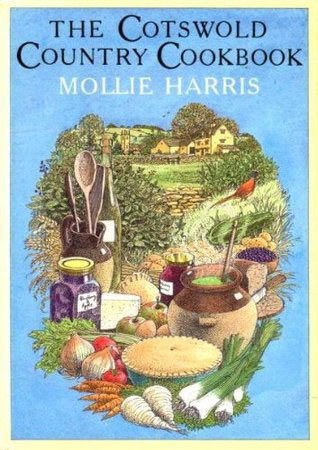Old School home cooks in Oxfordshire & its hilly environs.
The Cotswold Country Cookbook appeared in 1986. Mollie Harris had collected its recipes over the course of a year by walking the Cotswold Way with detours in the company of her daughter in law. (Harris 10) “We were,” Harris explains,
“invited into cottages to sample cider and gingerbread, into farmhouses for flapjacks and damson ale, and into big houses for coffee and cream cakes. This was how I gathered many of these recipes.”
The intelligent book amounts to a diligent field study, a sort of exercise in grassroots culinary anthropology. “The recipes,” Harris believes, “reflect the character of the Cotswolds.” They also reflect an almost timeless culture; reading them, it is difficult to believe she compiled them toward the end of the twentieth century instead of a hundred or even two hundred years earlier. Harris herself is so traditionalist that she uses imperial measurements even though the United Kingdom adopted the metric system just over two decades earlier. “Present-day living,” Harris claims, “has altered a few of the recipes,” but it is hard to see how.

The simplicity of each preparation is striking, and each one could not arise from anywhere but England. It is as if the Cotswold cook, and the style of the recipes is so rooted in place, has declined to consider anything cosmopolitan for her table. “So there are hot, warming meals of rabbit, duck, pheasant, good old English roast beef and, of course, lamb--for great flocks of sheep still dot the Cotswold hills.”
That is not all. ‘Cotsallers,’ as they call themselves, are not only carnivorous. (Harris 11) As conventional wisdom would expect, in this case correctly, all manner of characteristically English dessert emerges from the Cotswold kitchen; cider cake and an ingenious one incorporating mincemeat, marmalade and whisky cream from Stow-on-the-Wold ‘where the wind blows cold,’ crumbles, spotted dog, those flapjacks and that gingerbread, a raspberry rover, plum sponge, syllabub…. (Harris passim; 72)
The rover encapsulates the English tradition. It is a custard pudding that embraces crumbled fruit cake and raspberries, but only in season, spiked with a shot of Sherry. In common with mincemeat cake and any number of Cotsal recipes sweet and savory, the reader cannot help but infer that the rover emerged through the impulse of frugality, a refusal not to repurpose any leftover in a transformative way.
The pudding would be nearly as beguiling baked out of raspberry season with crumbs of mincecake and dried apricots in the manner of what Jane Grigson calls “the best winter fool.” (Grigson 256) On that and so much else she is right, and the simple phrase conveyed with confident conviction is emblematic of her assured style.
In a sense the local cast of the Country Cookbook is unsurprising as well as surprising. Harris herself, although something of a polymath, never lived farther than five miles from her birthplace. Although she did travel in connection with a storied career, or careers, she never lost her love of place for rural Oxfordshire. (Bartrip)
The Country Cookbook itself is all the more remarkable because it would appear to have been an afterthought. Harris collected her recipes at the age of seventy five after writing a number of other books, although food does figure in them. In particular she has written memoirs of high caliber, as Peter Bartrip demonstrates in this number of the lyrical. As he also discloses, Harris was a noted broadcaster and beloved television actress as well as author, “a bona fide Oxfordshire character.” It should be no surprise that one of the books this earthy character wrote is about privies in the Cotswolds.
Harris grew up poor but not utterly impoverished, and while others starved food appears on her the table, if at times dull and monotonous, in a country house that sheltered a large family. The recipes from others that she chose to publish reflect a frugal outlook rooted in the land and in the indigenous tradition. The preparations are more than appealing enough for the demanding palate and as a coincidental bonus straightforward enough for the novice cook.
Country Life
Harris herself is uninhibited enough to recount the story an “elderly lady” told her involving raw chitterlings, or pigs’ intestines, in Cotsal dialect:
“You might think this a bit far-fetched… but its gospel truth; happened to my eldest brother, Ted, it did when ’e was about seventeen. You see ‘e worked for a pig killing man and sometimes ‘e would give ‘im a bit of meat or offal to bring home to our mother. We was a big family and ‘er was very glad of it.
Well, one night just as ‘e was leaving work, his boss ses to ‘im, ‘yer be Ted Take these few chitlins home.’ They was raw, of course, and all wet and slippery, but our Ted knowed as our mother would be glad of um. Well he’d got no bag er nothing to put um in, so ‘e crammed um into his trouser pocket, not realisn’ as thur was a hole in it.
Now, on his way home ‘e catches up with a young girl from our village, walking home from work ‘er was, and our Ted--being a bit sweet on her--gets awf his bike and walks alongside her, trying to get awf with her like. They hadn’t walked very far when the girl suddenly shrieks out, ‘what’s that’ pointin’ to about four inches of chitlin that was danglin’ below our Ted’s trouser leg. Quick as a flash he whips out his pen-knife, cuts awf the piece that was showin’ and chucks it over the hedge, and the poor girl fell in a dead faint, and do you know, ‘er never spoke to our Ted ever again after that.” (Harris 130)
The Cotswold Country Cookbook is not just an invaluable artifact. It is in its way a modest work of art.
Peter Bartrip’s Appreciation of Mollie Harris appears, as noted in the text, in the lyrical and recipes from her cookbook appear in the practical.
Sources:
Peter Bartrip, “A rural childhood in interwar Oxfordshire: An Appreciation of Mollie Harris and A Kind of Magic”
Jane Grigson, English Food (London 1974)
Mollie Harris, The Cotswold Country Cookbook (London 1986)

